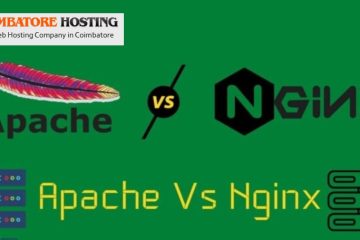AlmaLinux vs Ubuntu – Choosing the right operating system is incredibly important for successful website hosting and management. Two excellent options to consider are AlmaLinux and Ubuntu, which are both free and open-source Linux distributions. The great news is that they’re both supported by cPanel. Now, the question arises: how do you decide which one to use? (AlmaLinux vs Ubuntu)
Read on to find out.
What Is a Server Platform?
The server platform is the foundation for hosting websites, among other things. It provides the necessary resources, security, and infrastructure for handling client requests, managing data, and delivering services.
What Is an Operating System?
An operating system (OS) is a software component that acts as an intermediary between computer hardware and user applications. It manages computer resources, provides an interface for users to interact with the computer, and enables the execution of software programs.
What Is AlmaLinux?
AlmaLinux is a free and open-source Linux distribution designed as an alternative to CentOS Linux in December 2020. Developed and supported by the community-driven AlmaLinux OS Foundation, it aims to provide a stable and reliable operating system with long-term support, suitable for enterprise environments. AlmaLinux is built from the upstream source code of Red Hat Enterprise Linux (RHEL), ensuring compatibility and a seamless transition for users who were previously reliant on CentOS for their server infrastructure. With a focus on delivering a robust and community-driven alternative, AlmaLinux serves as a compelling choice for organizations seeking a stable and secure Linux distribution for their server needs.

Features of Alma Linux
- RHEL Compatibility:AlmaLinux is binary-compatible with RHEL, meaning applications and workloads developed or tested on RHEL can seamlessly run on AlmaLinux.
- Stability and Reliability: Like RHEL, AlmaLinux emphasizes stability and reliability, making it suitable for use in production environments where a robust and dependable operating system is essential.
- Long-Term Support (LTS):AlmaLinux provides long-term support for its releases, offering security updates and maintenance over an extended period. This is particularly important for enterprise users who require a stable platform for an extended lifecycle.
- Security Features:AlmaLinux inherits security features from RHEL, including SELinux (Security-Enhanced Linux) for access control policies, firewall management tools, and other security enhancements.
- Enterprise-Grade Package Management: AlmaLinux uses the RPM package management system, providing users with a familiar and powerful toolset for installing, updating, and managing software packages.
What is Ubuntu?
Ubuntu is among the popular distribution of the Linux operating system, which is first released in 2004. The first release was built on Debian (another Linux distribution). The main purpose of Ubuntu is to offer a user-friendly and intuitive experience for newcomers to the Linux experience.
Similar to Linux, it is also open-source and customizable. It comes in several versions, including Ubuntu Desktop, Ubuntu Server, Ubuntu Server, and Ubuntu Core (for IoT devices).
Features of Ubuntu
- Free and open-source: Ubuntu is free to download and use. There are no licensing fees or hidden costs.
- Secure: Ubuntu is constantly updated with security patches and improvements. It makes it one of the most secure operating systems available.
- Easy to use: Ubuntu is designed to be easy to use, even for beginners. The user interface is simple and intuitive. It offers a visually appealing desktop environment and a range of applications for productivity, multimedia, and entertainment purposes.
- Wide range of software: Ubuntu offers a complete operating system with pre-installed software and applications, including popular applications likeFirefox, LibreOffice, and GIMP. You can also install software from the Ubuntu Software Center or from third-party repositories.
- Versatile: Users can employ Ubuntu on various devices, such as desktops, laptops, servers, and even Raspberry Pi, offering versatility and adaptability across different hardware platforms.
- Support: Ubuntu has a large and active community of users and developers.
AlmaLinux vs Ubuntu
User-friendliness
AlmaLinux: provides a guided installation process where you can simply choose a few settings before the installation starts. They have a software center, but you won’t get the best experience. There isn’t much software to choose from in the software center. Searching also doesn’t help find what you’re looking for. The general way to install and update packages is to use the terminal.
Ubuntu: is targeted toward newbie Linux users. Hence, it’s one of the most beginner-friendly distros out there. Even if you have never installed Linux before, the guided installation wizard makes it a matter of making choices. The GUI is simple for anyone to get started. There’s a dedicated software center that makes installing software a breeze. Updating packages requires you only to press a button.
Hardware Compatibility
AlmaLinux: You can install AlmaLinux on both BIOS and UEFI firmware interfaces. It supports four different architectures: Intel/AMD (x86_64), ARM64 (aarch64), IBM PowerPC (ppc64le), and IBM Z (s390x).
Ubuntu: also supports various architectures, including Intel x86 (i386), AMD64 (x86_64), 64-bit ARM SoCs (System on Chip), IBM’s POWER8 (ppc64el), S390X (IBM Mainframe Systems)
Software Availability
AlmaLinux: According to pkgs.org, AlmaLinux 9 AppStream repo contains about 6500 packages. The BaseOS repo contains over 1200 packages. It also has access to the Extra Packages for Enterprise Linux (EPEL) repo, which contains about 17000 packages.
Ubuntu: The Ubuntu Universe repo contains about 59,000 packages, making Ubuntu one of the largest distros for available software.
Community Support
AlmaLinux: The AlmaLinux community contains everything you need to get support. Well-structured documentation, a discourse group known as Forums, Mailing Lists, Mattermost Community Chat, IRC Real Time Chat, a Discord community, and a Reddit community of about 5k members are some of the options you can look forward to when you need help regarding this distro.
Ubuntu: Being one of the most popular distros, has immense community support. The documentation is rich and extensive. You have IRC channels to join to ask about particular topics and get assistance. Ubuntu Discourse is another place for community discussion for current activities. For technical support, you can always visit Ubuntu Forums and AskUbuntu.
Update and Release Cycle
AlmaLinux: publishes new updates whenever there’s a new update of RHEL is available. It can take up to 1 business day. Major releases and updates, however, may take a few weeks to a few months after RHEL does a major release. You get 10 years of support like RHEL.
Ubuntu: has the traditional release cycle. They have mainly two release models. The first one is the Long-Term Support (LTS) version, which is released every two years. You get 5 years of support for the LTS version and an additional 5 years if you go for Ubuntu Pro. The other ones are interim releases coming out every six months between two LTS versions. These non-LTS versions receive support for 9 months.
Security
AlmaLinux: provides frequent security updates and bug fixes. Moreover, they provide you with many security packages and tools, such asOpenSCAP, Errata, and public OVAL streams. You also get SCAP Workbench packages, such as the availability of the official CIS Benchmark for AlmaLinux. Another noteworthy mention is the Software Bill of Materials (SBOM) integration in their build pipeline.
Ubuntu: has followed all security best practices since the beginning. Rapid security updates, out-of-the-box secure software packages, and hardening at scale all make Ubuntu a secure choice. The Canonical Livepatch service provides any major kernel issues fixes without needing to reboot your device.
Conclusion
And that ends our comparison of AlmaLinux vs Ubuntu. Both distros offer some unique features that cater to the target users.
Ubuntu is better suited to people new to Linux and needs a distro to get started. It’s better used for regular use on personal desktops and laptops.
AlmaLinux, on the other hand, is more suited for Enterprise environments. Thanks to its binary compatibility with Red Hat Enterprise Linux, it has gained fame quickly among organizations and companies.
AlmaLinux vs Ubuntu AlmaLinux vs Ubuntu AlmaLinux vs Ubuntu AlmaLinux vs Ubuntu AlmaLinux vs Ubuntu AlmaLinux vs Ubuntu AlmaLinux vs Ubuntu AlmaLinux vs Ubuntu AlmaLinux vs Ubuntu
